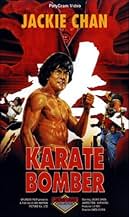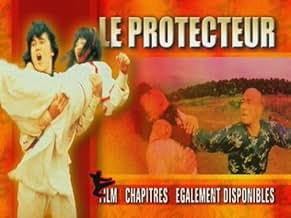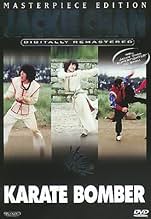AVALIAÇÃO DA IMDb
5,6/10
2,3 mil
SUA AVALIAÇÃO
Adicionar um enredo no seu idiomaA young man poses as "the Whip King" and collects the reward for a bandit he has seen killed by a famous bounty hunter. He must now learn Kung Fu if he is to live up to this new persona and ... Ler tudoA young man poses as "the Whip King" and collects the reward for a bandit he has seen killed by a famous bounty hunter. He must now learn Kung Fu if he is to live up to this new persona and conquer the enemies he has inherited.A young man poses as "the Whip King" and collects the reward for a bandit he has seen killed by a famous bounty hunter. He must now learn Kung Fu if he is to live up to this new persona and conquer the enemies he has inherited.
- Direção
- Roteiristas
- Artistas
Jackie Chan
- Jiang
- (as Jacky Chan)
Kang Chin
- Thousand-Faces
- (as Kong Kam)
- Direção
- Roteiristas
- Elenco e equipe completos
- Produção, bilheteria e muito mais no IMDbPro
Avaliações em destaque
Jackie is finally given creative control under the constraints of Lo Wei and here's the result: an early key to the new direction which sees Chan clowning about in his own distinct fashion, less Bruce Lee and more Charlie Chaplin, ridiculing the stifling pictures that were forced onto him at the same time as sending up the genre as a whole. Straight from the slapstick titles we know what we're in for; Chan perfecting his underdog happy-go-lucky character that would later make him such a huge star. Yet like all beginnings, HALOKF isn't a polished piece, certainly dragging in places with the Lo Wei influence still clearly evident (namely in the souped-up story concerning the transportation of sacred treasures the Evergreen Jade and the Soul Pill, much in demand by nasty bandits). Lo Wei's reaction was open detest resulting in the picture being shelved, only to be given a successful theatrical release after Chan had finally re-defined the kung fu movie.
I've said it before, I'll say it again: I think Jackie Chan's pre-Drunken Master movies are pure gold. Not for the same reasons that make'Drunken Master' and following movies gold, but gold nonetheless. 'Half a Loaf of Kung Fu' is rather gold. I swear, the more the 70s kung-fu movies I watch, the easier it becomes to watch them, and the more I like them and wish to seek out more. Now there's a scary thought...
I missed the name of Chan's character here. In fact, I missed most, if not all, of the character's names in this movie. Actually, I missed most of the plot too. Actually... Plot? What plot? I still can't figure out what this was actually about, and there no identifiable threads running in the plot other than the evil-witch and the treasure she wants to steal.
'Half a Loaf of Kung Fu' is very funny movie, and I'm sure Chan was trying to spoof kung-fu films. It probably would have worked had other kung-fu movies of the time not been sillier that 'Half a Loaf...' in the first place. The fight scenes are credible enough to maintain interest when the plot-apparent lags. 'Half a Loaf...' does drag on a bit at times, especially when it just gets to ridiculous. It probably could have been shorter, and much more entertaining for it.
It isn't the best of 70s kung-fu movies, but it is by no means the worst. Jackie Chan fans might get a kick out of this, as would others looking for something to laugh at - 6/10
I missed the name of Chan's character here. In fact, I missed most, if not all, of the character's names in this movie. Actually, I missed most of the plot too. Actually... Plot? What plot? I still can't figure out what this was actually about, and there no identifiable threads running in the plot other than the evil-witch and the treasure she wants to steal.
'Half a Loaf of Kung Fu' is very funny movie, and I'm sure Chan was trying to spoof kung-fu films. It probably would have worked had other kung-fu movies of the time not been sillier that 'Half a Loaf...' in the first place. The fight scenes are credible enough to maintain interest when the plot-apparent lags. 'Half a Loaf...' does drag on a bit at times, especially when it just gets to ridiculous. It probably could have been shorter, and much more entertaining for it.
It isn't the best of 70s kung-fu movies, but it is by no means the worst. Jackie Chan fans might get a kick out of this, as would others looking for something to laugh at - 6/10
Half A Loaf Of Kung Fu really is an early glimpse at the kung fu comedies that would make JC famous. You can really see that Jackie had influence over this production in both fight choreography and overall tone of the film. The opening sequences is really a highlight of this film and the choreography is solid in the fight scenes. Overall a very enjoyable film and a must for JC fans.
7 Tiny Wooden Dummies out of 10
7 Tiny Wooden Dummies out of 10
The film starts off well enough with the spoofy opening titles, where Chan adopts a number of famous roles – such as Zatoichi – and mercilessly takes the mick with them. From there on, it's pretty much typical comedy kung-fu nonsense for an hour; most of it tests the patience, but some of it is funny. This is certainly a fast paced movie with numerous characters; Chan is a kid who ends up impersonating the Whip Hero, then there are lots of different groups of bad guys who end up getting involved with him. There's an odious beggar, an evil witch, and guys with moustaches and long hair which usually turns out to be fake. Add in some kick-ass femme fatales and an old DRUNKEN MASTER style teacher with some killer moves, and you have a generic but fun outing.
The film definitely improves in the final half hour, in which a cargo of treasure is ambushed by all the bandits at once. Non-stop kung fu takes place until the very end of the film, with decent fighting and comedy in between to make it more entertaining – like Chan trying to learn new moves whilst being beaten pretty bad. The film has a weird sense of humour, no doubting that; there's a dream where Chan turns into Popeye (yep, the music is here again) and he does stuff like throw eggs at the bad guys to repel them. The ending is pretty violent with broken arms and necks. The varied characters and their mannerisms always entertain. The dubbing is the same as that in most of Chan's films from this era, annoying but sometimes funny with it. Nothing special, but pretty good for one of Jackie's '70s movies.
The film definitely improves in the final half hour, in which a cargo of treasure is ambushed by all the bandits at once. Non-stop kung fu takes place until the very end of the film, with decent fighting and comedy in between to make it more entertaining – like Chan trying to learn new moves whilst being beaten pretty bad. The film has a weird sense of humour, no doubting that; there's a dream where Chan turns into Popeye (yep, the music is here again) and he does stuff like throw eggs at the bad guys to repel them. The ending is pretty violent with broken arms and necks. The varied characters and their mannerisms always entertain. The dubbing is the same as that in most of Chan's films from this era, annoying but sometimes funny with it. Nothing special, but pretty good for one of Jackie's '70s movies.
Jackie had moved from the Peking opera to the film industry as a teen, but had done mostly bit parts, eventually gaining respect behind the scenes for his commitment to stuntwork and willingness to do anything in any film. However, Hong Kong directors were still trying to figure out what Bruce Lee had done, and he was suddenly gone... they tried to find a replacement for him and copy his films, but the magnetism and quality wasn't there, leaving the HK film industry churning out a lot of mostly forgettable schlock in the 70s.
Jackie was coming up in this time, and a lot of his earlier roles attempt to cast him in the part of the upstart hero. Audiences at the time didn't go for him however (he was well-known then for NOT being handsome) and directors tried casting him as a stock villain, which didn't really work either.
Finally, uber-director/producer Lo Wei let Jackie start having more creative control, finally resulting in Jackie acting as the 'action director' or 'martial arts director'. You see a bit of this in the film "Shaolin Wooden Men", but it starts really blooming here with "Half a Loaf of Kung Fu". In this film, you see a huge emphasis on comedy over action, and very avante' garde choreography for the fights. This is also a departure in tone from many of Jackie's previous films which centered on oppression and hardship and featured quite graphic violence, death, and rape. Here, the comedy is almost nonstop, with Chan continuing to fight a man even as he's just hanging impaled on a spear....which everyone soon realizes and all have a good laugh about.
The story bears a lot of similarities to several of Jackie's partnerships with Chi-Hwa Chen, like "Shaolin Wooden Men", and "36 Crazy Fists". The 'hero' is actually a bumbling fool, who nevertheless manages to improve his kung-fu to heroic levels in a very short period of time. Of course, the traditional kung-fu masters are actually not the best, the fool learns all the best techniques from old drunken hermits who taunt him as they berate and steal from him, much as Yoda later would to Luke. These same off-the-wall techniques are, of course, the secret to finally defeating the evil gangsters who are rampaging in the town/village/countryside. These films also all have a great number of random story elements and lightning-quick plot twists. Characters are introduced out of nowhere, form alliances, double-cross each other, patch things up, or ultimately die suddenly, all before you can figure out why they were in the film in the first place! If you're looking for Shakespeare, you won't find it here, but the story of this movie actually took me back to being 6 years old and just being amazed at the freshness and unpredictability of these films compared to your cookie-cutter Hollywood movie. There's a definite charm here.
The comedy, on the other hand, fell pretty flat for me. It doesn't quite work as a satire of the films at the time, and it's not as fine-tuned as the comedy in his later films.I chuckled a couple times, but mostly it was a lot of over-the-top cheesy slapstick that I don't think would appeal to most people that aren't an Asian audience in the 70s.
The martial arts is a bit of a mixed bag. The regular performers aren't doing anything very special here, and this is definitely an ensemble film. Even Jackie takes quite a while to warm up, as the whole point in the beginning is that his skills suck. The sequences toward the end of the film start becoming more and more inventive, though, and it's a kick to see Jackie 'learning' wacky techniques and then trying to apply them at every chance in future fights. The final fight is a worthy addition to the Chan 'notable fights' reel, with him attempting to study scrolls of techniques littering the ground WHILE fighting, so that he can then use those techniques IN the fight! It's good stuff, and exemplary of why this movie is the first real step into the Jackie Chan films we all later came to know and love.
Jackie was coming up in this time, and a lot of his earlier roles attempt to cast him in the part of the upstart hero. Audiences at the time didn't go for him however (he was well-known then for NOT being handsome) and directors tried casting him as a stock villain, which didn't really work either.
Finally, uber-director/producer Lo Wei let Jackie start having more creative control, finally resulting in Jackie acting as the 'action director' or 'martial arts director'. You see a bit of this in the film "Shaolin Wooden Men", but it starts really blooming here with "Half a Loaf of Kung Fu". In this film, you see a huge emphasis on comedy over action, and very avante' garde choreography for the fights. This is also a departure in tone from many of Jackie's previous films which centered on oppression and hardship and featured quite graphic violence, death, and rape. Here, the comedy is almost nonstop, with Chan continuing to fight a man even as he's just hanging impaled on a spear....which everyone soon realizes and all have a good laugh about.
The story bears a lot of similarities to several of Jackie's partnerships with Chi-Hwa Chen, like "Shaolin Wooden Men", and "36 Crazy Fists". The 'hero' is actually a bumbling fool, who nevertheless manages to improve his kung-fu to heroic levels in a very short period of time. Of course, the traditional kung-fu masters are actually not the best, the fool learns all the best techniques from old drunken hermits who taunt him as they berate and steal from him, much as Yoda later would to Luke. These same off-the-wall techniques are, of course, the secret to finally defeating the evil gangsters who are rampaging in the town/village/countryside. These films also all have a great number of random story elements and lightning-quick plot twists. Characters are introduced out of nowhere, form alliances, double-cross each other, patch things up, or ultimately die suddenly, all before you can figure out why they were in the film in the first place! If you're looking for Shakespeare, you won't find it here, but the story of this movie actually took me back to being 6 years old and just being amazed at the freshness and unpredictability of these films compared to your cookie-cutter Hollywood movie. There's a definite charm here.
The comedy, on the other hand, fell pretty flat for me. It doesn't quite work as a satire of the films at the time, and it's not as fine-tuned as the comedy in his later films.I chuckled a couple times, but mostly it was a lot of over-the-top cheesy slapstick that I don't think would appeal to most people that aren't an Asian audience in the 70s.
The martial arts is a bit of a mixed bag. The regular performers aren't doing anything very special here, and this is definitely an ensemble film. Even Jackie takes quite a while to warm up, as the whole point in the beginning is that his skills suck. The sequences toward the end of the film start becoming more and more inventive, though, and it's a kick to see Jackie 'learning' wacky techniques and then trying to apply them at every chance in future fights. The final fight is a worthy addition to the Chan 'notable fights' reel, with him attempting to study scrolls of techniques littering the ground WHILE fighting, so that he can then use those techniques IN the fight! It's good stuff, and exemplary of why this movie is the first real step into the Jackie Chan films we all later came to know and love.
Você sabia?
- CuriosidadesConsidered one of the earliest Kung Fu "spoof" movies.
- Versões alternativasUK video version is cut by 3m 7s. In 2002 all previous cuts were waived by the BBFC.
- ConexõesReferenced in Adjust Your Tracking: The Untold Story of the VHS Collector (2013)
- Trilhas sonorasThe Coach Robbery
Written by John Addison
Principais escolhas
Faça login para avaliar e ver a lista de recomendações personalizadas
Detalhes
Contribua para esta página
Sugerir uma alteração ou adicionar conteúdo ausente




























